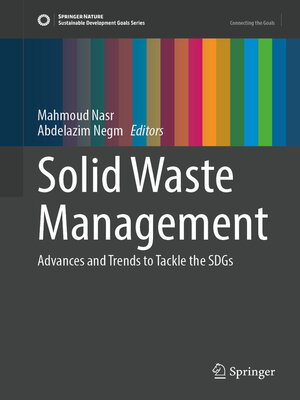Solid Waste Management
ebook ∣ Advances and Trends to Tackle the SDGs · Sustainable Development Goals Series
By Mahmoud Nasr

Sign up to save your library
With an OverDrive account, you can save your favorite libraries for at-a-glance information about availability. Find out more about OverDrive accounts.
Find this title in Libby, the library reading app by OverDrive.



Search for a digital library with this title
Title found at these libraries:
| Library Name | Distance |
|---|---|
| Loading... |
This book covers the latest advances in sustainable waste management and focuses on its implementation to mitigate water and air pollution, recycle and reuse raw material, and refine valuable metals. In this book, readers will learn about organic waste treatment, emerging waste management techniques, and the transformation of waste into value-added products. Particular attention is given to environmental sustainability and how we can better achieve it through innovative and responsible waste management practices.
Divided into 10 chapters, the book outlines a wide range of topics such as the sustainable management of food wastes through cavitation-assisted conversion, rapid bioconversion of animal meat waste into compost using black soldier fly larvae, thermoluminescence properties of combustion-synthesized nanomaterials and their applications for achieving Sustainable Development Goals, and the creative reuse of plastic waste with a case study by Ghanaian artists. Expert contributors uncover new methods and approaches to waste management that invite readers to think critically about the current practices and their impact on the environment. In addition to these discussions, the work explores the challenges of environmental health in waste management for peri-urban areas.
This book provides a unique blend of theoretical perspectives and practical case studies that will enrich the understanding of sustainable waste management, and it equips readers with the knowledge needed to contribute to a more sustainable future. The book is an invaluable resource for researchers in the field of environmental science, students at all levels studying sustainability and waste management, and practitioners working in industry.







